|

The PelicanWeb's Journal of Sustainable Development
Integral Human Development
Spirituality, Solidarity, Sustainability, Democracy, Technology, Nonviolence
|
Vol. 5, No. 9, September 2009
Luis T. Gutierrez, Editor
|
|
|

|
|
HOME
LOGO
MISSION
RESEARCH
LINKS
NEWS
TOOLS
LETTERS
DOWNLOADS
ARCHIVE
CALL FOR PAPERS
FREE SUBSCRIPTION
SELECTED
EDUCATION
RESOURCES
FOR
SUSTAINABLE
DEVELOPMENT
(click on the
images for
more info)

EARTH
CHARTER

EARTH
CHARTER
ESD

MILLENNIUM
DEVELOPMENT
GOALS

MAP OF
HUMAN
KNOWLEDGE

INTERNET ARCHIVE

WIKIPEDIA

UNITED NATIONS

UNESCO ESD

UNESCO ESD
GOOD PRACTICES


UNU IAS ESD

UNU GEIC ESD

GENDER
EQUALITY

TWO WINGS
OF A BIRD

SIENA
VIRTUAL
COLLEGE

UNICEF's
PHOTOS OF
THE YEAR

SOCIO-
ECONOMIC
DEMOCRACY

GLOBAL
CITIZENSHIP

MEDIA
GLOBAL

GLOBAL
FOOTPRINT

WORLD
ENV ORG

BIBLE
GATEWAY

QURAN
GATEWAY

SEXUAL
VIOLENCE
RESEARCH

BIODIVERSITY RESEARCH

ECOLOGICAL
INTERNET

FACING THE
FUTURE
EDUCATION
RESOURCES

WEBQUEST
EDUCATION
RESOURCES

EARTH INSTITUTE

ESD TOOLKIT

GEOGRAPHY
OF HUNGER

DIVINE
COMMUNION

WORLD
COUNCIL OF
CHRISTIAN
CHURCHES

ISLAM

JUDAISM

BAHÁ'Í

GIRARDIAN
BIBLICAL
REFLECTIONS

RELIGIOUS TOLERANCE

BCCA IEF ESD

IISD ESD

GDAE ESD

INTUTE

WCESD
APRIL 2009

UNDP
HUMAN DEVELOPMENT

UNDP
HDR 2009

WORLD BANK

GCAP

ISER

IFPRI

DEV ORGS

IICD

OECD

ELDIS

GSDRC

PEP NET

DEMOGRAPHIC
RESEARCH

WORLD
GOVERNMENTS

WORLD
UNIVERSITIES

GLOBAL
NONKILLING

WORLD
NEWSPAPERS

PLANET 2025

SHAPING
TOMORROW

WORLD
FUTURES

LITTLE EARTH SHOW

PAINT
FOR THE
PLANET

UNION OF
CONCERNED
SCIENTISTS

NEW
CIVILIZATION
NETWORK

DAMIETTA
PEACE
INITIATIVE

SLUM DWELLERS
INTERNATIONAL

INTEGRAL
ECOLOGY
CENTER

MICAH CHALLENGE

GRIST MAGAZINE

PUBLIC POLICY RESEARCH

LEARNING FOR A SUSTAINABLE LIVING

PLANET GREEN

GLOBAL
GOVERNANCE

LONDON SCHOOL OF ECONOMICS

INTEGRAL
INSTITUTE

DEVELOPMENT
CROSSING

WORLD DIGITAL LIBRARY

OXFORD
OPHI

USP ESD

UNFCCC
CLIMATE CONF
COPENHAGEN
DECEMBER 2009

LANGUAGE
OF THE HEART
|
|
Education for Sustainable Development - Part 6
SUMMARY
|
This issue is Part 6 of the series on Education for Sustainable Development (ESD). It provides a report on Version 1.7 of the ESD consultation. The number of respondents declined dramatically during the month of August. This may be a symptom of "survey fatigue." Therefore, there will be a hiatus in the ESD survey project until January 2010. Nevertheless, some excellent feedback was gathered via the V1.7 rankings of theme relevance and degree of difficulty for each of the UNESCO ESD themes, and even more so via the essay questions. The "lessons tentatively learned" in V1.7 are as follows:
- Version 1.7, like previous versions, yields high relevance rankings for the eight UNESCO "key action themes."
- The degrees of difficulty in overcoming obstacles also rank high, but not as high as the relevance of the "key action themes."
- This may be an indication that the "key action themes" are challenging, but not unfeasible.
- The promotion of human health has the largest gap between the criticality and difficulty rankings (cost and access are the main sources of difficulty).
- Surprisingly, gender equality has the smallest gap between the criticality and difficulty rankings (both are high but very close, and cultural and religious prejudices are the main sources of difficulty).
Achieving gender equality and reforming the current economic incentives (as well as disincentives) emerge as the most pivotal issues in sustainable development. Both are crucial to all the UN millennium development goals (MDGs) and all the UNESCO education for sustainable development (ESD) themes. Both are intrinsic to the social, political, economic, and environmental dimensions of sustainable development. Specifically, achieving gender equality is pivotal for integral human development. Reforming the current mix of economic incentives is pivotal for social and environmental justice. Neither one has a technological root cause, and neither one is amenable to a technological fix. Both are fundamental cultural issues with overlapping secular and religious dimensions.
In brief, this issue includes the following:
In page 1, Part 6 of the series on education for sustainable development (ESD).
- Section 1, a brief progress report on the ESD surveys.
- Section 2, clarification of sustainable development terminology.
- Section 3, an essay on integral human development.
- Section 4, an overview of sustainable development indicators
- Section 5, an essay on religious traditions and human development.
- Section 6, a review of survey-based evidence.
- Section 7, a review of recent scholarly research.
- Section 8, a review of some real life examples.
- Section 9, suggestions for prayer, study, and action.
In page 2, an invited paper entitled Study Poverty more than GNP, by Philippine economist and social activist Mahar Mangahas, on how continued growth in GNP may not correlate with poverty eradication and social wellbeing.
In page 3, an invited paper entitled Losing my religion for equality, by Jimmy Carter (USA President, 1977-1981), on the absurdity of perpetuating gender inequities in both secular and religious institutions.
In page 4, an invited paper entitled The myths and realities of feminism, by educator, journalist, and social justice advocate Elka N. Jackson, on some of the practical reasons (with real life examples) that make achieving gender equality indispensable if sustainable development is to have a human face.
|
| |
|
TABLE OF CONTENTS & NAVIGATION LINKS
| |
1. Progress Report on the ESD Project
The number of V1.7 respondents declined dramatically during the month of August. This may be a symptom of "survey fatigue." Therefore, there will be a hiatus in the ESD survey project until January 2010. Nevertheless, some excellent feedback was gathered via the V1.7 rankings of theme relevance and degree of difficulty for each of the UNESCO ESD themes, and even more so via the essay questions.
The themes of survey V1.7 correspond to the UNESCO ESD themes as follows:
Theme 1 (T1): relevance & difficulty of promoting gender equality
Theme 2 (T2): relevance & difficulty of promoting human health
Theme 3 (T3): relevance & difficulty of promoting environmental care
Theme 4 (T4): relevance & difficulty of promoting rural development
Theme 5 (T5): relevance & difficulty of promoting cultural diversity
Theme 6 (T6): relevance & difficulty of promoting human security
Theme 7 (T7): relevance & difficulty of promoting sustainable urbanization
Theme 8 (T8): relevance & difficulty of promoting sustainable consumption
Consider the following bar charts:
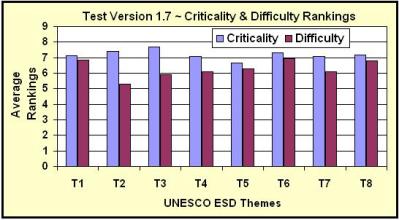
Figure 1. Version 1.7 ~ Criticality and Difficulty Rankings by Question
Version 1.7, like previous versions, yields high relevance (criticality) rankings for the eight UNESCO "key action themes." This view of the data shows that the degrees of difficulty in overcoming obstacles also rank high, but not as high as the "key action themes." Could this be an indication that the "key action themes" are challenging, but not unfeasible?
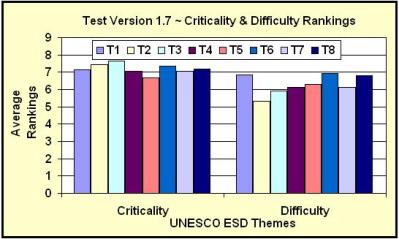
Figure 2. Version 1.7 ~ Comparative Criticality and Difficulty Rankings
This view of the data shows how the criticality and difficulty rankings cluster together. It is noteworthy that the criticality rankings for all the themes are approximately 7, while the difficulty rankings for all the themes are approximately 6. Could this mean that the root cause (or root causes) of obstacles for all the themes is (are) the same?
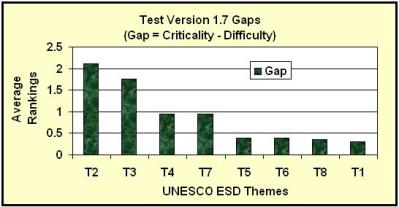
Figure 3. Version 1.7 ~ Pareto Histogram of Ranking Gaps
When the differences between the criticality and difficulty rankings for the eight themes are reordered in descending order, the largest difference corresponds to T2 (promotion of human health) and the smallest difference corresponds to T1 (promotion of gender equality). Promoting human health might seem to be basically and issue of cost and access, i.e., and economic issue; but gender, ethnicity, and other cultural factors may be involved. Promoting gender equality is basically and a cultural issue, but there may be some marginal economic considerations such as the greater physical strength of males.
Actually, it seems reasonable to conclude that the root cause for the difficulties associated with each of the eight themes are cultural, or economic, or a mix of both. But, ceteris paribus, the influence of culture on economics is stronger than the influence of economics on culture. Social and political factors are also influenced by economics, but even more so by culture. The bottom line is that the deepest root cause of difficulties for all the UNESCO ESD themes is primarily cultural and only secondarily economic, social, and political. Economic factors may be more visible because they are easier to measure, but economic measurements (GDP, GNP, etc.) are mostly driven by human priorities and human decisions. Economic measurements are but the observable symptoms of invisible (or barely visible) cultural mindsets.
2. Meaning of "Sustainable Development"
There seems to be some confusion about the proper meaning of "sustainable development" (SD). Perhaps the best definition is still the one provided in Our Common Future: Report of the World Commission on Environment and Development, dated 1987: "Sustainable development is development that meets the needs of the present without compromising the ability of future generations to meet their own needs."
One indispensable clarification is that "development" may include economic development (in the sense of economic growth) but is by no means limited to growth in the economic dimension. Indeed, all humans are made of flesh and blood, and therefore need to satisfy basic physical needs such as the need for food and water. But human beings are more than just flesh and blood. There is also the inner life of each human being, and there is also a need for spiritual growth which cannot be attained in isolation but can be attained by living in community with other human beings.
Another indispensable clarification is that "sustainable" means ecologically sustainable. Thus, sustainable development is development that must keep happening from generation to generation without irreversible detriment to the human habitat, i.e., the biosphere and wider physical environment in which humans abide. There are no limits to wisdom, and there are no limits to growth in human solidarity and spirituality. But there are biophysical limits to the rates of extraction, consumption, and disposal (including pollution) of material resources. New technologies may relax some limits temporarily, but other limits will always emerge.
Sustainable development is a people-centric process. Sustainable development is about the development of people today and the continued development of people in future generations. And it must be sustainable development of all people, i.e., all human beings, not just a few. In order to make clear the all inclusive, people-centric nature of sustainable development, sometimes the term "sustainable human development" (SHD) is used. This terminology is useful to make it clear that sustainable development is human development that is ecologically sustainable.
However, human development cannot happen in a vaccuum. It can happen only in a concrete "web of life" context that includes cultural, social, political, economic, environmental, and many other dimensions. Barrett C. Brown and others at the Integral Institute have proposed the term "integral sustainable development" (ISD) to take into account the required integration of all dimensions of the process. These are the basic references:
An independently (?) conceived term is "integral human development" (IHD). It captures the notion that human development is the cornerstone of sustainable development, and overlaps with "sustainable human development" and "integral sustainable development." The following is the definition used by Catholic Relief Services (CRS):
|
"Integral Human Development (IHD) is a central component of the CRS agency strategy and the work CRS does with its partners. The concept, founded in Catholic social teaching, affirms that human development cannot be reduced or separated into component parts. Rather, personal well-being can only be achieved in the context of just and peaceful relationships and a thriving environment. It is the sustained growth that everyone has the right to enjoy. Integral Human Development promotes the good of every person and the whole person; it is cultural, economic, political, social and spiritual."
See also Integral Human Development (IHD):
The Concept and the Framework and A User’s Guide to the CRS Integral Human Development, CRS, Baltimore, Maryland, 2008.
|
But there is more. Since integral human development cannot happen in isolation from other human beings, it follows that it requires integral community (social) development. This in turn requires
integral nuptial communion, and this in turn requires
integral cross-gender communion with a rock solid foundation of
cross-gender solidarity. This solid foundation of cross-gender solidarity cannot exist as long as humanity is not liberated from the phallocentric (or phallagocentric) syndrome. The phallocentric syndrome is a disease that humanity can and must overcome. Overcoming this syndrome is a sign of the times, and the collaboration of all men and women of good will is required; for it is inconceivable that integral human development can happen as long as we have 50% of humanity struggling to dominate or manipulate the other 50%. The secular and religious institutionalization of this syndrome is the most formidable obstacle to sustainable development and, in particular, integral human development. More about this in the next section.
In brief, sustainable development is not simply a matter of economic growth. It is not simply a matter of finding technological fixes to population growth, consumerism, resource depletion, toxic waste, pollution-induced climate change, and other biophysical issues. These biophysical issues are important and should not be underestimated. But sustainable development is primarily a matter of seeking the integrated development of each and every human person and each and every communion of persons-- physically, intellectually, psychologically, spiritually.
3. Integral Human Development (IHD)
That human development is pivotal for sustainable development is now widely recognized. The United Nations Millennium Development Goals (MDGs) and the UNESCO key action themes on Education for Sustainable Development (ESD) illustrate both the people-centric nature of sustainable development and the need for considering the interdependence between all dimensions of human life:
Millennium Development Goals
MDG 1. Eradicate poverty and hunger
MDG 2. Ensure Universal Education
MDG 3. Promote Gender Equality
MDG 4. Reduce Infant Mortality
MDG 5. Improve Maternal Health
MDG 6. Mitigate the HIV/AIDS epidemic
MDG 7. Ensure environmental sustainability
MDG 8. A global partnership for development
|
Education for Sustainable Development
ESD 1. Educ for gender equality
ESD 2. Educ for health promotion
ESD 3. Educ for environmental stewardship
ESD 4. Educ for rural development
ESD 5. Educ for cultural diversity
ESD 6. Educ for peace and human security
ESD 7. Educ for sustainable urbanization
ESD 8. Educ for sustainable consumption
|
Perhaps the best synthesis of knowledge and experience in human development can be found in the annual Human Development Reports (HDRs) of the United Nations. This annual publication started in 1990, and there are 19 Global HDRs (HDR 2009 is scheduled for publication in October 2009). In addition to these 19 global reports, there are 35 Regional HDRs (for Africa, Arab States, Asia, Europe, Latin America, and the Arctic) and over 600 National and Sub-National HDRs covering over 140 countries. Any of these can be located and downloaded from the HDR Search and Downloads web site.
The integration of all dimensions of sustainable development and, specifically, human development, is a continuing concern. There are many variations of terminology, but the central concern is basically the same. For instance, the term "integral human development" is not unrelated to the ideas of integral sustainable development and the content of the Human Development Reports, but serves to emphasize both the anthropocentric nature and the total context of the sustainable development process.
Criticality of Gender Equality
Gender equality is a critical ingredient of that total context. In particular, the role of women in integral human development is critical for the integral development of both men and women. Based on the best available research and experience, there is an increasingly increasing consensus that this is the case (see sections 6 to 8).
In the 20th century, it started with Sigmund Freud's misogynist theory about "penis envy" being the root cause of neurosis in women. Then came the breakthrough of Carl Jung's analytical psychology, which produced the concepts of anima and animus, whereby all human beings have both masculine and feminine tendencies -- the anima being the unconscious feminine presence in men and the animus being the unconscious masculine presence in women. Awareness of this feminine presence in men and masculine presence in women is essential for the process of psychological growth, or individuation. The following are some key references:
The Destiny of Man, Nicholas Berdyaev, Harper, 1960.
The Invisible Partners: How the Male and Female in Each of Us Affects Our Relationships, John Sanford, Paulist Press, Paulist Press, 1980.
Two Wings of a Bird: The Equality of Women and Men, Baha'is, 1997.
Carl Jung and Analytical Psychology, Wikipedia as of 2 September 2009.
Jungs theory was preceded by the intuition of many scholars going back to ancient philosophers, not to mention the early chapters of the book of Genesis. For a historical summary see Individuation in Fairy Tales, Marie-Louise von Franz, Spring, Zurich, 1977, pp. 90 ff. This is a recent example:
|
"Man is not only a sexual but a bisexual being, combining the masculine and the feminine principle in himself in different proportions and often in fierce conflict. A man in whom the feminine principle was completely absent would be an abstract thing, completely severed from the cosmic element. A woman in whom the masculine principle was completely absent would not be a personality. ... It is only the union of these two principles that constitutes a complete human being. Their union is realized in every man and every woman within their bisexual , androgynous nature, and it also takes place through the intercommunication between the two natures, the masculine and the feminine." Nicholas Berdyaev, The Destiny of Man, Harper, 1960, pp.61-62.
|
Actually, the last sentence of Berdyaev's statement needs clarification. There are not "two natures, the masculine and the feminine." There is one human nature -- the nature of homo sapiens sapiens, which is both male and female. Surely, men and women are different and mutually complimentary, but this complementarity does not make them either exclusively male or exclusively female except genitally. It follows that the social and religious roles of men and women do not have to be mutually exclusive. Except for their mutual genital complementarity, all men and women share one and the same human nature; and all men and women share all the potentialities and limitations of the human condition. Human nature, male and female, has been known to be shared by all human beings since the beginning (Genesis 1, 2, 5); but it was scientifically explained for the first time by Carl Jung (1875-1961), who also explained how the male and female in each human being influence both personal inner growth and interpersonal relations. Sanford summarizes the essential dynamics of Jung's individuation process as follows:
"The most important contribution Jung makes in his concepts of the anima and the animus is to give us an idea of the polarity that exists within each of us. We are not homogeneous units of psychic life, but contain an inevitable opposition within the totality that makes up our being. There are opposites within us, call them what we like -- masculine and feminine, anima and animus, Yin and Yang -- and these are eternally in tension and are eternally trying to unite. The human soul is a great arena in which the Active and the Receptive, the Light and the Dark, the Yang and the Yin, seek to come together and forge within us an indescribable unity of personality. To achieve this union of the opposites within ourselves may very well be the task of life, requiring the utmost in perseverance and assiduous awareness. Usually men need women for this to come about, and women need men. And yet, ultimately the union of the opposites does not occur between a man who plays out the masculine and a woman who plays out the feminine, but within the being of each man and each woman in whom the opposites are finally conjoined."
John Sanford, The Invisible Partners, Paulist Press, 1980, page 112.
|
Jung's work became a watershed for the understanding and promotion of integral human development in individual persons, as well as the interpersonal relations between men and women, and especially between husbands and wives. Thus the importance of Jung's insight for the nuptial dimension of sustainable development. This nuptial dimension is indispensable for sustainable sharing of the gift of love and the gift of life and is, therefore, indispensable for sustainable development. The resulting benefit to human relations and nuptial covenants has been beautifully expressed in many pieces of art, such as the following:
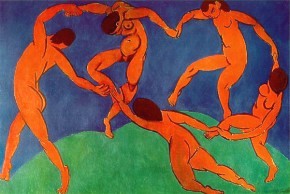
"La Danse" by Henri Matisse, 1909
The Hermitage Museum, St Petersburg, Russia
Sens Public International Webjournal, October 2007
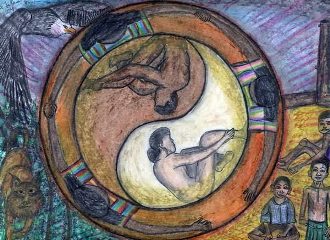
"Nuptial Covenant" by Farid de la Ossa Arrieta, 2005
School of Theology, Australian Catholic University
Australian E-Journal of Theology, August 2005
The Phallic Syndrome
The phallic (or phallocentric, phallagocentric) syndrome (i.e., the preference for what is masculine) is rooted in the misconception that both men and women are human beings, but men more so than women. This absurdity has led to women being excluded from many roles of authority and leadership, with great loss to human civilization. In particular, it has led to the exclusion of women from roles of religious authority, and there is evidence (see sections 5 to 8 below) that such exclusion is an obstacle to the integral human development of both men and women. Clearly, this is the work of human hands and contrary to God's will; for God only desires what is good and enhances human wellbeing.
Recent Vatican Document
A document entitled On Integral Human Development in Charity and Truth was recently published by the Vatican. It is a very comprehensive and lucid exposition about all the issues that pertain to integral human development -- except gender equality. In fact, the issue of gender equality is not even mentioned. This is both lamentable and perplexing to all sensitive men and women of the 21st century. It is fascinating to follow the semantic gymnastics used to avoid facing the gender equality issue since it emerged from the collective unconscious during the second half of the of the 20th century. Deborah Halter has documented the process in excruciating detail. A brief synopsis is as follows:
In 1988, the Vatican published a document On the dignity and vocation of women, in which it was finally admitted that women are fully human and not inferior to men. However, the document reiterated that the role of women excluded representing Christ, because Christ was a male. So women are not inferior to men but, somehow, only men can represent the humanity of Christ, who was a male. In other words, men and women are equally human, but men are more human than women. Then, in 1994, the Vatican published another document, On Reserving Priestly Ordination to Men Alone. Perhaps this should not be surprising, since the Roman Catholic Church is a rigid patriarchy in which only males can have roles of religious authority.
But it is a matter of record that, since 1994, the Vatican has been attempting to suppress any discussion about the ordination of women. This is a discussion that keeps coming up everywhere as people realize that the 1994 document is a fundamentalist concoction. And the issue will not go away, but the Vatican's
theologically baseless -- and pastorally harmful -- belligerence in perpetuating the male-only priesthood calls for some form of tough love. The PelicanWeb advocates that public subsidies be removed from all institutions (both secular and religious) that perpetuate gender discrimination. The Roman Catholic Church, and other religious institutions that persist in excluding women from roles of religious authority, need a good dosage of tough love.
4. Sustainable Development Indicators
There is a need to measure -- as best we can -- progress in the sustainable development process. A number of indices (i.e., numerical indicators) have been formulated by various institutions. Some of them are general measures of progress toward a sustainable world, others are specific measures of progress pertaining to a given dimension of sustainable development. The following is a list (in alphabetical order) of links to some of the available indices:
The list is not exhaustive. Each one of these indices should be used with care, and only after analysis of the factors taken into account and the credibility of the data used to calculate them. For any analysis of progress in sustainable development, the best practice is to use two or more indices and compare the results. If all indices point in the direction of progress, there can be more confidence that the progress is real; else, any individual index is of limited value. The reader is encouraged to visit the links and see how the indices are formulated, the objective and implicit assumptions of each index, and the databases used for their calculation. Some of these indices have been around for years, and trend charts are provided. Charts showing how index values are distributed geographically are also very informative.
5. Religious Traditions & Human Development
Let us consider the hypothesis that the exclusion of women from roles of religious authority is an obstacle to the integral human development of both men and women. It is well known that poverty is a significant obstacle to integral human development. Unless all the researchers and institutions cited in section 3 are wrong, we also know that gender inequality is a significant obstacle to integral human development. Indeed, it is also a significant obstacle to poverty eradication. And, it is self-evident that religious gender inequality is bound to reinforce secular gender inequality. Let us consider the data in Figures 4, 5, and 6.
|
0.950 or higher 0.900–0.949 0.850–0.899 0.800–0.849 0.750–0.799
|
0.700–0.749 0.650–0.699 0.600–0.649 0.550–0.599 0.500–0.549
|
0.450–0.499 0.400–0.449 0.350–0.399 under 0.350 not available
|
Figure 4 - Global Geography of Human Development (HDI 2007-2008 & Wikipedia)
The HDI combines life expectancy, education, and GDP per capita (GDPPC).
Figure 4 is a worldwide geography of human development. Let's see how these geographic patterns correlate with the world geographic patterns for poverty and gender equality.
Figure 5 - Global Geography of Poverty (HDR 2007-2008 & Wikipedia)
Poverty is estimated as the percentage of population living
on less than $1.25 per day
A visual comparison of Figures 4 and 5 clearly shows the correlation between poverty and human development, and it is reasonable to infer that poverty is the cause of human underdevelopment. Let us now consider the world geography of gender equality:
Figure 6 - Global Geography of Gender Equity (Social Watch, GEI 2008)
The GEI measures the gap between men and women in education, economic participation, and empowerment.
As expected, a comparison of Figures 4, 5, and 6 shows that the countries with high gender equity correlate with low percentage poverty and high human development. Conversely, the countries with low gender equity correlate with high percentage poverty and low human development. What about social development? The Sustainable Society Index (SSI) is interesting in that it is based on 22 indicators grouped into 5 categories: personal development, healthy environment, social development, sustainable use of resources, and global sustainability. The following map shows the world geography of sustainable social development, i.e., the communitarian dimension of sustainable development:
Figure 7 - Global Geography of Sustainable Social Development
Sustainable Society Foundation, SSI 2008
The SSI is a combined measure of human and social development
in the context of sustainable development.
Note: Green and light yellow identify the more sustainable societies (Sweden is #1). Dark yellow and orange identify
the less sustainable societies
(even though some of them are very wealthy!).
The "big picture" that emerges from Figures 4 to 7 shows that the countries with high gender equity correlate with low percentage poverty, high human development, and high social development. Conversely, the countries with low gender equity correlate with high percentage poverty, low human development, and low social development. Let us now consider the global geography of religions:
Figure 8 - Global Geography of Major Religious Traditions (Wikipedia, 2009)
Visual inspection of Figures 4 to 8 shows that human underdevelopment, social underdevelopment, high percentage poverty, and severe gender inequities coincide with certain religions, while other religions coincide with robust human development, strong social development, mitigated poverty, and a high degree of gender equity. It would be hard to believe that this is mere coincidence. Correlations do not establish causality, but it would seem logical to infer that religions do influence human and social development, and do so mainly via dogmatism about gender roles. It is clear that both human development and social development are highest in countries which are not influenced by religions that perpetuate ancient misconceptions about gender roles.
Numerical values by country for HDI and other indices are available. Data is also available on the percent of the population that adhere to each of the major religions by country. There are countries in which 50% or more of the population adheres to a given religion, and this is considered to be the prevailing or majority religion for those countries. In other countries, several religions may coexist without any of them being the prevalent or majority religion. To refine the analysis a bit further, three indicators were selected:
- Human Development Index (HDI)
- Based on life expectancy, education, and GDP per capita
- HDI values are available for 179 countries
- Sustainable Society Index (SSI)
- Based on personal development, healthy environment, social development, sustainable use of resources, and global sustainability
- SSI values are available for 151 countries
- Gender Equity Index (GEI)
- Based on the gap between men and women in education, economic participation, and empowerment.
- GEI values are available for 157 countries
These were matched to the countries in which the Catholic Christian, Orthodox Christian, Protestant Christian, and Islamic (either Sunni or Shi'ite) religions are dominant. Since the HDI, SSI, and GEI have been calculated for different numbers of countries (179, 151, and 157 respectively) the following comparative analysis is based on the top 10% of countries with the highest ranking for each of the three indexes. Table 1 is a summary comparison:
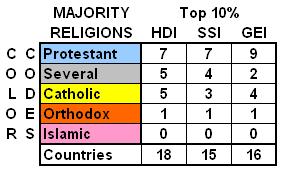
Table 1 - Comparative Analysis of Religions and Human Development
Table 2 shows the countries by name:
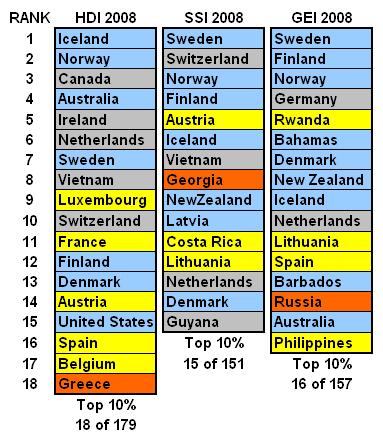
Table 2 - Comparative Analysis of Religions, Countries, and Human Development
Due to data availability constraints, it has not been possible to formally accept or reject the very specific hypothesis proposed at the beginning of this section. However, all the available evidence points to accepting the hypothesis. Religious institutions are not ethereal. Believers may see in them reflections of divinity, but they are nevertheless an organic part of human society. Integral human development cannot happen in isolation from the total socio-religious organism in which men and women are embedded. And, needless to say, the case for accepting the hypothesis as true should not and is not based exclusively on numerical data. Other important kinds of evidence are briefly reviewed in the following sections.
6. Review of Survey-Based Evidence
There is some survey-based data on the interaction between religion and society with specific focus on gender equality. For instance, in 1995 Michael Hout and Andrew Greeley conducted a survey among Roman Catholics in several countries. The objective was a gather data about the desires of Roman Catholics for church reforms, including the ordination of women. There were six questions:
"1. Which would you consider more important in choosing a pope, that the pope show more concern about what life is like for ordinary people or that the pope should show more concern about religious issues?
"2. Would you favor or oppose the next pope permitting priests to marry?
"3. Currently Catholic bishops are appointed by the Vatican. In the past bishops were elected by priests and people within their own dioceses. Would your prefer the next pope to continue to appoint bishops or would you prefer to have bishops chosen by priests and people within their own diocese?
"4. How would you feel about letting representative lay people have more of a voice in the Catholic Church for example by serving as advisors to the pope. Would you favor this?
"5. Would you like to see the next pope give more decision making power to the bishops in this country or do you think the pope should continue to make most of the decisions for the church?
"6. Would you favor or oppose the next pope allowing the ordination of women to the priesthood?
"7. Would you like the next pope to be more open to change in the church or do you think things are OK the way they are?"
|
Figure 9 provides a summary of the results:
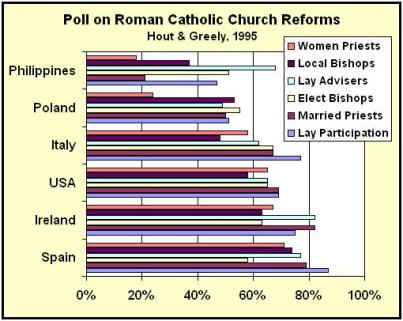
Figure 9 - Summary Results of the Hout-Greeley 1995 Survey
As already mentioned in section 3, in 1994 On Reserving Priestly Ordination to Men Alone the Vatican had published a document (with much fanfare and smoke screens of pseudo-infallibility) about "reserving priestly ordination to men alone." Yet one year later, the majority desire of the faithful is precisely the opposite in four out of six countries. Not surprisingly, only the most conservative Catholic countries (Poland and the Philippines) had been persuaded that the ordination of women was a bad idea. In Italy, the USA, and Spain over 60% of Roman Catholics had not been persuaded that women cannot or should not be ordained; in Ireland, over 80% were in favor of ordaining women. Obviously, the "sense of the faithful" had not been consulted prior to the 1994 declaration. The Roman Catholic Church, which always had followed the prevailing culture in excluding women from roles of religious authority, now wants to be "counter-cultural."
This does not mean that organized religion is not influential. Organized religion is influential, as shown by the analysis presented in section 3. See also the recent State of the States: Importance of Religion, Gallup, January 2009, and Religion, Secularism Working in Tandem in Bangladesh, Gallup, July 2009. The influence of organized religion is especially strong in matters of gender equality.
7. Review of Scholarly Research
In response to the first (early 1900s) and second (late 1900s) waves of feminism, there has been an enormous amount of research activity which has produced huge number of publications. For a very comprehensive gateway to this literature, see Joan Korenman's Women's Studies Online Resources. The following is a very brief list of selected examples:
Process of individuation: Exercitia spiritualia of St. Ignatius of Loyola, Carl Jung, Eidgenossische Technische Hochschule, Zurich, June 1939-March 1940
The Invisible Partners: How the Male and Female in Each of Us Affects Our Relationships, John Sanford, Paulist Press, 1980
The End of Patriarchy, Claudio Naranjo, Amber Lotus, 1994
In Memory of Her: A Feminist Theological Reconstruction of Christian Origins, Elisabeth Schussler Fiorenza, Crossroad, 1994
Gender and the Nicene Creed, Elizabeth Ranking Geitz, Morehouse, 1995
Two Wings of a Bird: The Equality of Women and Men, Baha'is, 1997
Eve's Seed: Biology, the Sexes, and the Course of History, Robert McElvaine, McGraw Hill, 2002
Hidden Penalties of Gender Inequality, Siddiq Osmania and Amartya Sen, Economics and Human Biology, 2003
The Papal No: The Vatican's Refusal to Ordain Women - A Comprehensive Guide to the Vatican's Rejection of Women's Ordination, Deborah Halter, Crossroad, 2004.
The Perchance of the Coming of the Other Woman: Deconstruction of "phallagocentrism" from duel to duo, Jacques Derrida, Sens Public International Webjournal, October 2007
Women, politics, and power: a global perspective , Pamela Paxton & Melanie Hughes, 2007
The Suppressed Histories Archives, Max Dashu, 2009
Women, politics, and power: a global perspective , Pamela Paxton & Melanie Hughes, Pine Forge, 2007 (see pages 53-54, 97, 110-112, 174, 232-235)
The Perchance of the Coming of the Other Woman: Deconstruction of "phallagocentrism" from duel to duo, Jacques Derrida, Sens Public International Webjournal, October 2007
Unfinished Business: Difference, Leadership, and Women's Equal Citizenship - Part One of a Two-Part Series, Grossman & McLain, FindLaw, 31 August 2009
Unfinished Business: Sex Equality on the Global Agenda - Part Two of a Two-Part Series, Grossman & McLain, FindLaw, 31 August 2009, FindLaw, 1 September 2009
The Suppressed Histories Archives, Max Dashu, 2009
Half the Sky: Turning Oppression into Opportunity for Women Worldwide, Nicholas Kristof & Sheryl WuDunn, 2009 (Forthcoming)
You will know the truth, and the truth will make you free (John 8:32). The truths of divine revelation have been misinterpreted many times. When it becomes clear that our understanding of divine revelation is irrational in light of scientific evidence, then either our religious understanding is wrong or our scientific understanding is wrong. Perhaps they are both wrong. Then it is time to dig deeper rather than finding refuge in either a facile dogmatism or an uncritical acceptance of scientific evidence. And let us keep in mind that the voice of God continues to resound in the events of history (the so-called "signs of the times"). At the end of the day, we shall know the truth, and the truth will make us free.
8. Some Examples from Real Life
A good resource is Directory of UN Resources on Gender and Women's Issues. The following is a very brief list of recent examples:
Gender and human development, UN Human Development Report, 1995
Education for gender equality, UNESCO Education for Sustainable Development, 2005
Because I am a Girl: The State of the World's Girls 2008, The Communication Initiative, 2008
Empowering Women as Key Change Agents, The Hunger project, 2009
Handbook on gender violence launched, Ann Kanina, Kenya, June 2009
Impact of religion on women’s leadership roles, WLUML, July 2009
View on women shows gender equality is still a dream,
William-Mervin Gumede, Sowetan, 05 August 2009
The Striking Correlation Between a State’s Religion and Its Politics, Dan Gilgoff, US News & World Report, 7 August 2009
The Women’s Crusade: How changing the lives of women and girls in the developing world can change everything, Kristof & WuDunn, New York Times Magazine Special Issue, 17 August 2009
Why Women's Rights Are The Cause of Our Time, Current, 22 August 2009
Women still struggle for equality, Faranaaz Parker, South Africa, 2 September 2009
It is well known that "old habits die hard," and there should be no false hopes that achieving gender equality will be a panacea for sustainable development, but the following is a fitting concluding thought:
|
"If the injustices that women in poor countries suffer are of paramount importance, in an economic and geopolitical sense the opportunity they represent is even greater...in a large slice of the world, girls are uneducated and women marginalized, and it’s not an accident that those same countries are disproportionately mired in poverty and driven by fundamentalism and chaos. There’s a growing recognition among everyone from the World Bank to the U.S. military’s Joint Chiefs of Staff to aid organizations like CARE that focusing on women and girls is the most effective way to fight global poverty and extremism. That’s why foreign aid is increasingly directed to women. The world is awakening to a powerful truth: Women and girls aren’t the problem; they’re the solution." How changing the lives of women and girls in the developing world can change everything, Kristof & WuDunn, New York Times Magazine, 17 August 2009.
|
Amen!
9. Prayer, Study, and Action
The following suggestions for prayer, study, and action are focused on gender equality.
Suggestions for Prayer
The following is a prayer to keep the faith in the midst of organized religion:
How baffling are you, O Church,
and yet how I love you!
How you have made me suffer,
and yet how much I owe you!
I should like to see you destroyed,
and yet I need your presence.
You have given me so much scandal
and yet you have made me understand sanctity.
I have seen nothing in the world
more devoted to obscurity,
more compromised, more false,
and I have touched nothing more pure,
more generous, more beautiful.
How often I have wanted
to shut the doors of my soul in your face,
and how often I have prayed
to die in the safety of your arms.
No, I cannot free myself from you,
because I am you, though not completely.
And where would I go?
"The God Who Comes"
Carlo Carretto, 1910-1988
Suggestions for Study
Read one or more of the following articles:
The Bible Hurts Women
Gender equality in the mainstream religions
Do women have a prayer?
Gender equality ends at the pew
Sexism, or gender discrimination, is a reality women face all over the world
- What do you think about gender equality and sustainable development?
Suggestions for Action
Consider the following questions:
- What have you done to promote gender equality?
- What are you doing to promote gender equality?
- What will you do to promote gender equality?
Answer them honestly, and do not be afraid of ridicule. There can be no integral human development without cross-gender solidarity.
Archive of ESD Survey Forms & Reports
The Education for Sustainable Development (ESD) research project is moving forward as a series of surveys to identify the critical issues that sustainable developers must be ready to face. The survey is structured around the "key action themes" proposed by UNESCO for the "Decade of Education for Sustainable Development" (2005-2014):
The following diagram represents the survey design:
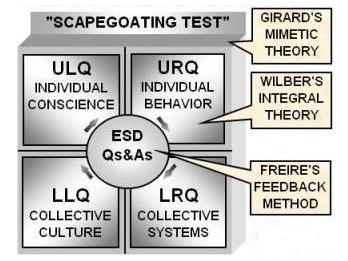
Diagram of the ESD Survey Design
The design is based on:
- Paulo Freire's educational model of recursive questions and answers
- Ken Wilber's integral model of experience, behavior, systems, and cultures
- René Girard's mimetic theory of scapegoating behavior
- Note: For a complete description of the design evolution, click here
The survey of the design is stable. However, the questions still need more work pursuant to an optimal combination of brevity (maximum of 16 questions), neutrality (unbiased questions), and questionnaire coverage of the most critical issues in sustainable development. Thus far the responses have been as follows:
- As of 24 April 2009, 61 persons had taken the V0 test survey.
- As of 27 May 2009, 129 persons had taken the V1 test survey.
- As of 27 June 2009, 263 persons had taken the V1.5 test survey.
- As of 31 July 2009, 513 persons had taken the V1.6 test survey.
- As of 29 August 2009, 36 persons had taken the V1.7 test survey.
Links to the forms, data, and analyses for the initial series of surveys are listed below:
TEST SURVEY VERSION 0 (40 QUESTIONS) - APRIL 2009
TEST SURVEY VERSION 1.0/1.1 (40 QUESTIONS) - MAY 2009
TEST SURVEY VERSION 1.5 (40 QUESTIONS) - JUNE 2009
TEST SURVEY VERSION 1.6 (16 QUESTIONS) - JULY 2009
TEST SURVEY VERSION 1.7 (32 QUESTIONS) - AUGUST 2009
TEST SURVEY VERSION 1.8 (2.0?) - TBD
-
Education for Sustainable Development - Part 6 - September 2009
- Part 6 provides a preliminary analysis of Version 1.7
- A comprehensive analysis of Versions 0 to 1.7 is underway
- Analysis results will be reported in the remaining 2009 issues
- ESD Consultation Form (TBD)
- ESD Consultation Spreadsheet (TBD)
- ESD Consultation Summary Report (TBD)
- Analysis of ESD Survey Test Data (TBD)
Version 1.8 (2.0?) is in preparation. The small number of V1.7 respondents may be a symptom of "survey fatigue." Therefore, there will be a hiatus in the ESD survey project until January 2010.
|Back to SUMMARY|
|Back to OUTLINE|
|Back to SECTION 1|
|Back to SECTION 2|
|Back to SECTION 3|
|Back to SECTION 4|
|Back to SECTION 5|
|Back to SECTION 6|
|Back to SECTION 7|
|Back to SECTION 8|
|Back to SECTION 9|
| Link to Page 2 |
| Link to Page 3 |
| Link to Page 4 |
|Link to the Home Page|
INTERNATIONAL ECUMENICAL PEACE CONVOCATION

Kingston, Jamaica, will be the host city for the International Ecumenical Peace Convocation in May 2011. The convocation is sponsored by the World Council of Churches (WCC) and will meet under the theme "Glory to God and peace on earth". It will be the culmination of the WCC's Decade to Overcome Violence (DOV), which has sought to network and bring attention to the peacemaking initiatives of its various member churches. For more information, see the convocation announcement.
|
|
|
Sign of the Times
Gender Equality
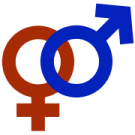
Source: Wikipedia
Gender equity is a "sign of the times." Gender inequities are universally rooted in the utter misconception (the so-called "phallic syndrome") that men are superior to women, and lead to incalculable forms of physical and psychological gender violence. It follows, that gender inequities constitute a huge obstacle to human solidarity and sustainable development. It is imperative to overcome, sooner rather than later, gender inequities in both secular and religious institutions, because human development stagnates in the absence of gender balance, and this cannot possibly be what God desires.
Visualization
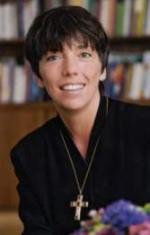
Bishop Margot Kaessmann
Lutheran Church
Hanover, Germany
Unity in Diversity
Unity in diversity enriches both the individual and the community, and so does diversity in unity. Unity in uniformity enriches neither the individual nor the community, and forced uniformity never leads to unity of hearts. In fact, forced uniformity leads to a fossilization of human relations that eventually corrupts unity and brings about tensions and even violence. For neither individuals nor communities can stay healthy (let alone happy) when confined to any form of straitjacket. Both human development and community development wither when constrained by forced uniformities. It follows that unity in uniformity makes sustainable development impossible. But sustainable development flourishes when unity and diversity enhance each other, thus enabling humanity to forge ahead along the path of peace and justice.
Visualization

Illustrated Map on
Peoples of the World
Announcements
Conferences 2009
WORLD POPULATION
The International Union for the Scientific Study of Population (IUSSP), 27 September - 2 October 2009, Marrakech, Morocco. For more information, visit the conference website and contact marrakech2009.
ISLAMIC THOUGHT
International Seminar on Islamic Thought, National University of Malaysia, Bangi, Selangor, Malaysia, 6-7 October 2009. For more info visit the conference website.
WOMEN, LEADERSHIP & MOSQUES
CFP: Women, Leadership and Mosques: Changes in Contemporary Islamic Authority. Oxford University, 16-17 October 2009. Please send proposals to Hilary Kalmbach.
KNOWLEDGE ECONOMY
International Conference on Knowledge Economy, South Africa, October 20 - 22nd.
See the conference website. The point of contact is Carmen Fitz-Gerald.
SOCIAL RIGHTS
International Symposium on Social Rights, 22-23 October 2009, Akdeniz University, Antalaya, Turkey. For more information, please visit the conference website . The main point of contact is sosyalhaklar. Additional contacts are Prof. Nergis Mütevellioglu, Assist. Prof. Hale Balseven, Research Assist. Mehmet Zanbak.
SCIENTIFIC STUDY OF RELIGION
Discoveries in the Scientific Study of Religion, Denver, 23-25 October 2009. Visit the SSSR2009 conference website. Point of contact: Kraig Beyerlein, Program Chair.
AFRICA GIS
International Conference Africa GIS2009, 26– 29 October 2009, Kampala, Uganda. For more information, please visit the AFRICAGIS2009 web site and contact AfricaGIS 2009.
CLIMATE CHANGE
The world's climate neutral Scientific Climate Conference, 2-6 November 2009 online. Organized by the Hamburg University of Applied Sciences. For more information, visit the CLIMATE 2009 conference website and contact the conference staff at CLIMATE 2009. Note: the website already includes a listing of climate studies available at the Climate Change Studies Library (CCSL).
STATE OF THE WORLD CONFERENCE 2009
November 12-14, 2009, Washington DC. Sponsored by the Integral Institute (Ken Wilber et al). The theme is: "Mobilizing to Save Civilization: A Ten Year Plan to Address Climate Change." From the conference web site: "It is to bring attention to the critical issue of climate change and to catalyze a ten year plan to green our economies that the State of the World Forum is convening a three day conference November 12-14, 2009 in Washington D.C. The 2009 Forum will launch a ten year campaign that will meet in a different world city each year." Current point of contact: DC Hilton Hotel, Washington DC, USA, 1-202-483-3000.
Other contacts will be posted as they become available.
BEHAVIOR, ENERGY &
CLIMATE CHANGE
The 2009 BECC Conference is the 3rd annual conference focused on accelerating our transition to an energy-efficient and low carbon economy through an improved understanding and application of social & behavioral mechanisms of change. Sponsored by the American Council for an Energy-Efficient Economy (ACEEE). When: November 15-18th, 2009. Where: Washington DC. For more details visit the BECC 2009 Conference web site or contact the BECC 2009 Conference Chair.
EARTH SYSTEM GOVERNANCE
"Earth System Governance: People, Places, and the Planet." 2009 Amsterdam Conference on the Human Dimensions of Global Environmental Change. Amsterdam, 2-4 December 2009. Launch event of the Earth System Governance Project, a new ten-year research programme under the auspices of the International Human Dimensions Programme on Global Environmental Change (IHDP). For more information, visit the conference website or contact Frank Biermann.
PARLIAMENT OF THE
WORLD'S RELIGIONS
Parliament of the World's Religions, 3-9 December 2009, Melbourne, Australia. Key topics: Healing the Earth with Care and Concern, Reconciling with Indigenous Peoples, Overcoming Poverty in a Patriarchal World, Securing Food and Water for all People, Building Peace in the Pursuit of Justice, Creating Social Cohesion in Village and City, Sharing Wisdom in the Search for Inner Peace. For more info: PWR2009.
Conferences 2010
ROAD TO NUCLEAR ZERO
AND ARMS CONTROL
Sponsored by the International School on Disarmament and Research on Conflicts (ISODARCO), Università di Roma "Tor Vergata," Rome, Italy. Location: Andalo (Trento). Dates: 10-17 January 2010. The 2010 ISODARCO Winter School will be devoted to the practical steps to be implemented to arrive to a nuclear-weapon free world, with emphasis on the potential role for arms control. Apply on-line at the ISODARCO web site or download an application form from the same location. Applications should arrive not later than 16 November 2009 and should be addressed to the Director of the School, Prof. Carlo Schaerf
NEW GREEN ECONOMY
The National Council for Science and the Environment (NCSE) is pleased to request your participation at the 10th National Conference for Science, Policy and the Environment: The New Green Economy: Aligning Science, Education, Markets and Systems for Sustainability to be held January 20-22, 2010 at the Ronald Reagan Building and International Trade Center in Washington, DC. Please plan to join NCSE in a large interactive conference to develop and advance science-based solutions for the creation of a “green print” to achieve a sustainable, new green economy. See the conference website. Questions? Contact the NCSE Green Economy Conference
ART & SOCIAL JUSTICE
Durban University of Technology and Art for Humanity invite you to a three day international conference on Art and Social Justice. Dates: 21 – 24 March 2010.
Venue: Durban University of Technology (DUT), Ritson Rd Hotel School, Conference Centre, Durban, South Africa. Point of contact: Art & Social Justice Conference.
ENERGY TRANSITIONS
Energy transitions in an interdependent world. Sponsored by the Science & Technology Policy Research Group, University of Sussex. The conference will be held at the University of Sussex, near Brighton, on the 25th and 26th February 2010. Further details including the full conference call and application guidelines are available from the conference web site. Point of contact: Lee Stapleton.
EVO-ENVIRONMENT
EvoEnvironment 2, an event of the EvoApplications Conference is devoted to the use of nature inspired methods for environmental issues. Istanbul Technical University, Istanbul, Turkey, 7th - 9th April 2010. Further details including the full conference call and application guidelines are available from the EvoStar 2010 Web Site. Points of contact: Marc Ebner, University of Tuebingen, Germany, and Neil Urquhart, Edinburgh Napier University, UK.
GLOBAL HEALTH
The World's Leading Idea Incubator For Global Health Innovation A Conference Presented Annually by Unite For Sight. Saturday, April 17 - Sunday, April 18, 2010. Yale University, New Haven, Connecticut, USA. The Global Health & Innovation Summit convenes more than 2,200 participants from 55 countries. The Summit challenges students, professionals, educators, doctors, scientists, lawyers, universities, corporations, nonprofits, and others, to develop innovative, effective solutions to achieve global goals. Visit the conference web site for registration and contact information.
APPLIED ENERGY
International Conference on Applied Energy (ICAE2010). Sponsored by the University of Singapore. Theme: "Energy Solutions for a Sustainable World." 21-23 April 2010, Singapore. Call for papers and other conference information: ICAE 2010 Web Site. Point of contact: ICAE 2010.
SELF-DETERMINATION
The 4th International Conference on Self-Determination Theory (SDT) will be held at Ghent University (Belgium), May 13-16, 2010. More information about the conference is provided in the SDT Conference Web Site, including guidelines for papers and posters submissions. Point of contact: Maarten Vansteenkiste.
ENERGY EFFICIENCY
Conference sponsored by the International Energy Agency (IEA) and the International Energy Program Evaluation Conference (IEPEC). Paris, France, 8-10 June 2010. Theme: "Counting on Energy Efficiency-It's Why Evaluation Matters!" Web sites: IEPEC 2009 and IEPEC-IEA 2010. Email: Cara Lee Mahany Braithwait.
SUSTAINABLE DEVELOPMENT IN FOOD & AGRICULTURE
International Symposium: Innovation and Sustainable Development in Food & Agriculture (June 28-July 1, 2010, Montpellier, France). Theme: "Facing the crisis and growing uncertainties, can science and societies reinvent agricultural and food systems to achieve sustainability?" Sponsored by CIRAD. For more information: ISDA 2010 Web Site. Email: ISDA 2010.
SOCIOLOGY CONGRESS
International Sociological Association (ISA) World Congress of Sociology, 11-17 July 2010, Gothenburg, Sweden. Session on "Peace, Conflict, and Climate Change" currently scheduled for Wednesday 14 July 2010. See the conference web site for more details or contact the conference chair, Hans Joas, Universität Erfurt, Germany.
RELIGION: A HUMAN PHENOMENON
International Association for the History of Religions (IAHR), 15-21 August 2010, Toronto, Canada. Visit the conference website. The conference director is Professor Donald Wiebe.
ECOLOGICAL ECONOMICS
ISEE 2010. This is the 11th Biennial Conference of the International Society for Ecological Economics (ISEE). Theme: "Advancing Sustainability in a Time of Crisis." To take place in Oldenburg and Bremen, Germany, 22 - 25 August 2010. For more information visit the conference web site. A presentation containing general information about the conference can be downloaded here. The point of contact is Prof. Bernd Siebenhüner, Oldenburg University.
Conferences 2011
STUDY OF THE COMMONS
The International Association for the Study of the Commons (IASC) has announced its 13th biennial conference. The conference will be hosted by Foundation for Ecological Security (FES). It will take place in Hyderabad, India, 10 - 14th January 2011. To visit the IASCP web site, click here. A PDF file containing general information about the conference can be downloaded here. For more information contact IASC executive director, Jim Robson.
PEACE CONVOCATION
The International Ecumenical Peace Convocation (IEPC) will be the Harvest Festival of the Decade to Overcome Violence and at the same time a planting season for fresh initiatives. May 2011, Kingston, Jamaica. Sponsored by the World Council of Churches (WCC). Visit the IEPC web site, which provides points of contact worldwide.
CFPs
CALL FOR PAPERS
SUSTAINABILITY SCIENCE
Proceedings of the National Academy of Sciences of the United States of America (PNAS). PNAS has launched a new section of the journal dedicated to sustainability science, an emerging field of research dealing with the interactions between natural and social systems, and with how those interactions affect the challenge of sustainability: meeting the needs of present and future generations while substantially reducing poverty and conserving the planet’s life support systems. PNAS seeks original research contributions for this new section on both the fundamental character of interactions among humans, their technologies, and the environment, and on the use of such knowledge to advance sustainability goals relevant to water, food, energy, health, habitation, mobility, and ecosystem services. PNAS welcomes outstanding sustainability science papers addressing spatial scales from the global to the local and drawing on a wide range of disciplinary and multidisciplinary approaches. For more information, please contact Josiah Armour.
CALL FOR PAPERS
RELIGION & SPIRITUALITY
This issue of Feminist Review, edited by Lyn Thomas and Avtar Brah, will explore a range of religious and spiritual practices through the lens of gender, and will encompass both theoretical and empirical approaches. We hope to engage with feminism’s long history of critique of the patriarchal nature of world religions such as Christianity, Judaism and Islam, and more recent problematisations of these approaches in light of feminism’s relationship to the Enlightenment and to colonialism. Recent work on the gendering of secularisation theories and on women’s practice of faith and spirituality has complicated and nuanced feminist approaches to religion; this issue will address these questions, while attempting to broaden the debate beyond the binary oppositions and alignments of religion (and most notably Islam) with tradition and ‘backwardness’, and of feminisms with modernity and secularism. Submissions for the issue are welcomed from now until February 28th, 2010. Point of contact: Dr Lyn Thomas.
MUST READ
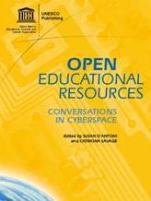
Open Educational Resources: Conversations in Cyberspace
Edited by Susan D'Antoni and Catriona Savage, UNESCO
Paris, France
August 2009
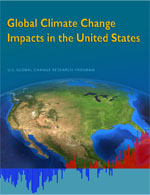
Global Climate Change
Impacts in the United States
US Global Change
Research Program
Washington DC
June 2009
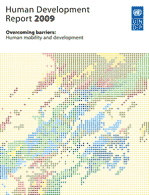
UNDP
Human Development
Report 2009
Overcoming barriers:
Human mobility and development
Scheduled for publication
October 2009
PelicanWeb
Call for Papers
|
Both subscribers and nonsubscribers are cordially invited to submit a paper to be considered for publication in the PelicanWeb Journal of Sustainable Development as an "invited paper." It should be related to the journal's theme about solidarity, sustainability, and nonviolence as the three pillars of sustainable development. In particular, the current focus is on education for sustainable development. Some suggested themes:
Successful initiatives to foster solidarity, sustainability, and nonviolence
Gender equality as a positive factor for sustainable development
Removal of obstacles for progress toward any or all the UN MDGs
Management of technologies for social and environmental justice
How to foster human development via spirituality and the inner journey
How to foster human and social development via acts of solidarity
How to improve systems of governance via checks and balances
How to evolve collectively toward a culture of sustainability
Invited papers will be published in a separate web page. If you have friends who could submit a good paper, please invite them to do so.
Please email your papers to the Editor.
| |
Recent News
|
| |
|
|
|
"Human development, if not engendered,
is fatally endangered."
Mahbub ul Haq
Pakistan (1934-1998)
|
|
Page 1
|
|
FREE SUBSCRIPTION
|
![[groups_small]](groups_small.gif)
|
Subscribe to the
"PelicanWeb's Journal of
Integral Human Development"
via the Solidarity-Sustainability Group
Enter your email address:
|
|
|
|